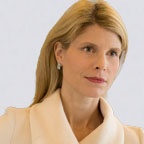Corporate Citizenship Career Path: Executive Forum
- Mon Oct 24 19:41:16 UTC 2016
- Katherine V. Smith
The following is excerpted from Issue 17 of The Corporate Citizen. To learn more about how you can develop the strategies and skills that will prepare you to lead your teams and colleagues to a new level, consider applying for our Leadership Academy, which will be held on campus at Boston College November 13-17, 2017.
For more than six years, the Boston College Center for Corporate Citizenship has benefited from the guidance and expertise of its Executive Forum. This unique network brings together senior-level professionals from a wide range of industries to provide corporate citizenship leadership, inspiration, and knowledge, and influence the public discourse of the role of business in society. Here, a sampling of Forum members share their journeys to corporate citizenship leadership, as well as what they’ve learned along the way.

Executive Forum at the 2016 International Corporate Citizenship Conference
 Marlene Ibsen | @mmibsen
Marlene Ibsen | @mmibsen
Vice President, Community Relations, Travelers; President and Chief Executive Officer, Travelers Foundation
How did you enter the field of corporate citizenship?
In 2000, I was in a public relations role and began taking on responsibilities related to the company’s community relations activities. I had experience working with nonprofits, so it seemed like a natural progression. In seeking advice on how to manage the program from our corporate foundation staff, I was pointed to the Boston College Center for Corporate Citizenship and thus began a valuable learning and development relationship.
What is the biggest lesson you’ve learned in your career?
Assume positive intent. It’s easy, especially with electronic communications, to misread intent or project an agenda when there is none. By approaching relationships with an open mind, and making it a priority to reach out, communicate clearly and to be transparent in your own actions, you often are able to minimize wasteful activities and reduce stress—for yourself and others.
What is the most important behavior or practice you employ to advance your corporate citizenship program?
Taking a collaborative approach helps develop and maintain positive relationships, which in turn creates a team atmosphere where everyone has the opportunity to contribute and be recognized for accomplishments. The challenge is to be sure everyone on the team knows who (or which organization) is accountable for various parts of the work. Also, in order for the collaboration to work, it’s important to establish a trusting environment where all participants feel free to share positive feedback and constructive criticism, to ensure the project or program is continually improving and yielding the desired results.
What advice would you give to those beginning their corporate citizenship career?
Stay focused on the dual mission of the work. For me, that means continually seeking the intersection between community need and company interests. That balance ensures that our team is seen as offering value to both internal and external stakeholders.
 Anne Gross | @IUAnnieG
Anne Gross | @IUAnnieG
Director, Corporate Responsibility, KPMG LLP
How did you enter the field of corporate citizenship?
I was working as a grant maker with a large public charity. I joined KPMG to consult and advise other grant makers. I had the great fortune of working on an internal engagement supporting our corporate citizenship team. After years of doing projects with the group, I made the transition from consultant to full-time citizenship practitioner.
What is the biggest lesson you’ve learned in your career? The most important behavior or practice you employ to advance your corporate citizenship program?
It is essential to gather the background information and data—be sure you understand an issue from all perspectives. As you plan a new program and/or interventions, recognize where you are starting (baseline) and what you want the outcomes and impacts to be.
What advice would you give to those beginning their corporate citizenship career?
Be a student to of the business—understand products, services, and the value chain, and know your firm’s stakeholders. To create shared value, you need to first understand the value that your business is creating and recognize how and what it does can improve society and add value to the communities where your firm operates (or wants to operate).
 Harry Spencer | @jetblue
Harry Spencer | @jetblue
Vice President, Compensation, Benefits & Corporate Social Responsibility, JetBlue Airways
How did you enter the field of corporate citizenship?
My current position came to me in a corporate reorganization. Executive leadership apparently spotted my natural interest in giving back and Inspiring Humanity (JetBlue’s mission) and I was asked to lead our CSR function at JetBlue. I am very fortunate to work with a small (but mighty) team of CSR professionals!
What is the biggest lesson you’ve learned in your career? The most important behavior or practice you employ to advance your corporate citizenship program?
In the decades I’ve been working and all the organizations I’ve been part of, I simply look for opportunities to add value and solve problems. I’ve found that by focusing on these basics, my career has taken care of itself.
What advice would you give to those beginning their corporate citizenship career?
To advance my work, I’m guided by “Three T’s,” i.e., trust, transparency and thoughtfulness, with a focus on innovative signature programs.
What advice would you give to those beginning their corporate citizenship career?
Follow your passion, while applying logic. Yes, logic is important too in today’s business world.
 Shannon Schuyler | @ShannonSchuyler
Shannon Schuyler | @ShannonSchuyler
Principal, Chief Purpose Officer & Corporate Responsibility Leader, PwC; President, PwC Charitable Foundation
How did you enter the field of corporate citizenship?
I came into corporate citizenship randomly, I had never considered it as part of my career journey. However, after years of broad exposure to the complexities of PwC, I saw the value of creating a CR/ Sustainability group based on the business needs to drive brand visibility, increase employee engagement, and address the escalation of societal issues that our business could help solve.
What is the biggest lesson you’ve learned in your career? The most important behavior or practice you employ to advance your corporate citizenship program?
There have been SO many life lessons in my career: Be intellectually curious; outwork everyone; hold on tightly, let go lightly; live with no regrets, etc. In my sustainability career specifically, resiliency, courage, and strategic negotiation skills have been critical to success.
What advice would you give to those beginning their corporate citizenship career?
The best way to begin depends on what sector you want to step into first: for corporate practitioners, lead with business value and leveraging core skills; for nonprofit professionals, focus on true impact, giving in a broad sense, and the power of merging like organizations; for government employees, the impact of regulations and the need for cross sector collaboration should be your main focus.

Tim Mohin | @TimJMohin
Senior Director, Corporate Responsibility, AMD
How did you enter the field of corporate citizenship?
I studied environmental management at Duke University and started out working in environmental policy with the Environmental Protection Agency and the U.S. Senate. In the mid- to late 1990s—when companies were just beginning to understand the business and social value of acting responsibly, I joined Intel Corporation. Early on, we focused on the more traditional issues of regulation and compliance, but over the years, both the company and my career evolved into corporate citizenship.
What is the biggest lesson you’ve learned in your career? The most important behavior or practice you employ to advance your corporate citizenship program?
First, be flexible: Corporate citizenship is a broad area and you will have to work on things that are outside your comfort zone—be that lifelong learner that takes on new challenges with gusto. Second, lead through influence: CSR professionals must cooperate and align with other business functions in order to be effective. Third, be a good communicator: CSR leaders must be proficient at telling the company’s story. They often have to communicate to a board audience in multiple formats, so doing this well is an essential skill.
What advice would you give to those beginning their corporate citizenship career?
Never lose sight of your passion to change the world. Working for the greater good from inside a corporation can have its ups and downs. While it can be tough and the progress can be slow, if you keep your sights on the bigger picture, you can contribute to massive improvements for people and the planet.*
* If you’d like to hear more from Tim, check out his book: “Changing Business From the Inside Out: A Treehugger’s Guide to Working in Corporations”
Ready to advance your professional development to Know More, Do More & Achieve More in corporate citizenship? Click here to our upcoming course calendar.
